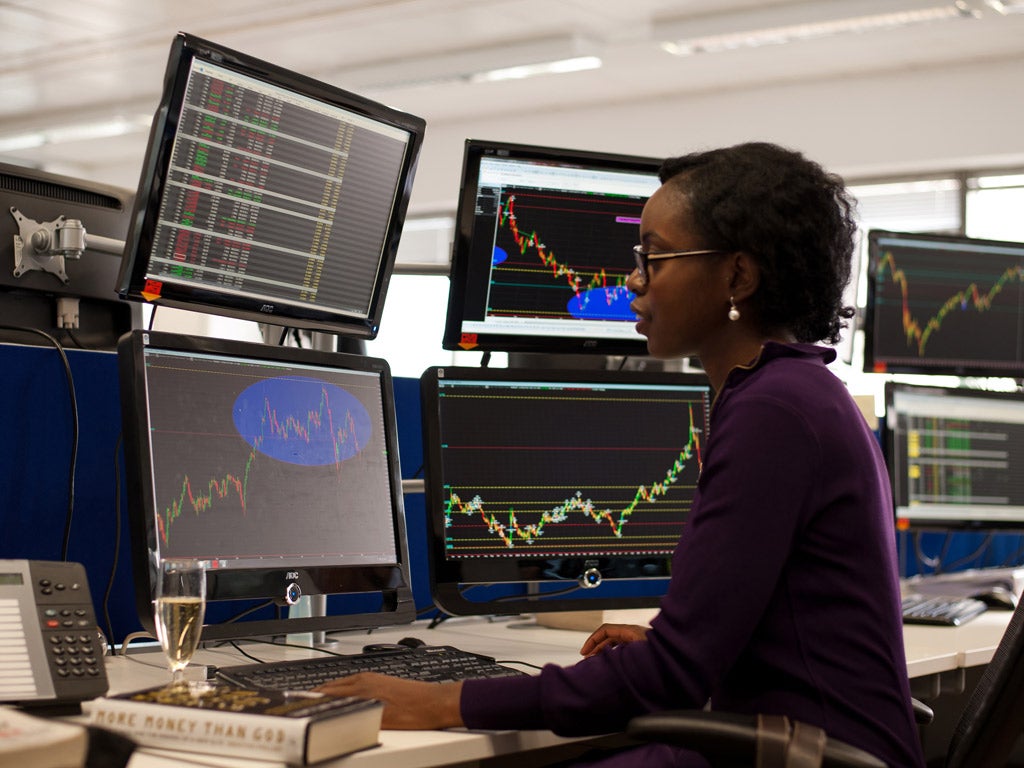Women break into the City's old-boy network
... And their methodical approach can make them better traders than men, says Sabuhi Gard

The number of women trading the stock market is on the rise, according to City Index, one of the UK's leading providers of spread betting and foreign exchange trading.
Its research shows that on average the numbers of women using its services to trade is increasing by 124 per cent year on year, far higher than the percentage increase in men.
Zak Mir, a former technical editor of Shares magazine and an investment blogger, says: "The financial crisis, the raised profile of the markets and EU debt issues have undoubtedly brought more people in general, and women in particular, to trading."
Mr Mir adds , however, that women traders have a mountain to climb with regard to City perceptions: "In the macho trading environment and culture it's not uncommon to regard women traders in the same vein as women drivers. As insurers will tell you, women drivers are safer than men and it is almost certain that – as far as the ability to follow a strategy and be disciplined – women win out."
Alan Green, the chief executive of the social networking and share trading website Traders Own, has seen an upsurge in female traders using his site. "Female traders make up 11 per cent of the total number of Traders Own trading accounts. Previously with ShareCrazy, 5 per cent of our traders were female."
So what is encouraging more women to trade financial products such as contracts for difference (CFDs), stock market indices and currencies? The money? The excitement of day trading? Or the convenience of working from home?
Justin Urquhart Stewart, the managing director of Seven Investment Management, says: "More women have got involved in financial issues over the past few years due to media coverage about savings rates, pensions and investing in other financial products such as stocks and shares.
"They are taking on the burden of their own and the family finances more than in the past; hence the increase in trading."
Justin Modray, the founder of candidmoney.com, believes it's a combination of factors – including the potential buzz. "The advent of online investing, especially spread betting, has made fairly complex trading very accessible and appealing to those who fancy taking a punt. Successful trading can also be euphoric as well – some traders live for the buzz successful trades can bring," he says.
Mr Urquhart Stewart says that when it comes to investment decisions, women tend to be more considered rather than taking a "quick punt".
In her book Warren Buffett Invests Like A Girl: And Why You Should, Too, author LouAnn Lofton outlines traits that make women more successful investors than men. According to Ms Lofton, female investors: trade less than men; are less overconfident; are more realistic; put in more effort researching investments; try to consider every angle and detail, as well as alternative points of view; are more immune to peer pressure and tend to make decisions the same way regardless of who's watching; learn from their mistakes and are less willing to take extreme risks.
Mr Mir agrees that women approach trading in a different way. "Men are drawn to trading as an extension of a recreational punt, many regarding it as an expensive hobby, whereas women regard it as a business venture to be approached seriously. This more mature approach is always going to be biased towards a better result."
Christopher Beauchamp, a market analyst at IG Group, says roughly 10 per cent of its trading customers are female. "[Women] use smaller bet sizes, opting to test the water first, rather than putting their whole account on one trade," he says. "Their longer-term trades often mean they are more successful, holding on to positions for longer, rather than jumping in and out of trades."
Research by the Barclays Female Client Group also highlights that 39 per cent of female investors admit to getting stressed by trading, compared with 29 per cent of men. This relates to a greater desire for discipline or self-control, something that 45 per cent of women expressed, against just 39 per cent of male respondents.
And biology has a direct impact on the success of women, according to Dr Emily Haisley, a behavioural finance expert at Barclays. "Several studies link financial risk-taking to testosterone. Men are more likely to be confident, though not more accurate, in their financial decisions; and women tend to value wealth as a source of security, not opportunity."
Case study: Marcie Hollington, Retired, 60
Mrs Hollington started trading with Halifax Share Dealing last November because she wanted to make some money and put her existing shares in to an ISA. Currently, she trades in mainly in bank shares
"I'm very cautious so I've got Goldman Sachs, Lloyds, Royal Bank of Scotland and Apple. I think the banking sector will do well over the next couple of years and I bought Apple because I have a lot of their products and I think it's a great company."
Mrs Hollington trades around £2,000 a month: "I don't trade because I have to. I'm retired and financially independent. I do it because it's a good use of my money and it's interesting. My husband and I have worked hard all our lives and we want to make sure our money works hard for us now."
She doesn't believe men make better traders than women. "The qualities that a trader should have aren't dependent on gender," she says.
The current financial crisis has not put her off trading. "Quite the reverse: it's a great opportunity. Wasn't it Warren Buffett who made his fortune from buying when everyone else was selling?"
Join our commenting forum
Join thought-provoking conversations, follow other Independent readers and see their replies
Comments
Bookmark popover
Removed from bookmarks